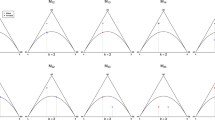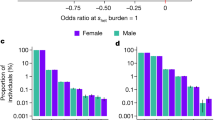Abstract
THE problem of the “antedating” of family diseases is one of very great interest, and is likely to be more studied in the near future than ever it has been in the past. The idea of antedating, i.e. the appearance of an hereditary disease at an earlier age in the offspring than in the parent has been referred to by Darwin, and has no doubt been considered by others before him. Quite recently, studying the subject on insanity, Dr. F. W. Mott speaks of antedating or anticipation as “nature's method of eliminating unsound elements in a stock” (“Problems in Eugenics,” papers communicated to the First International Eugenics Congress, 1912, p. 426).
This is a preview of subscription content, access via your institution
Access options
Subscribe to this journal
Receive 51 print issues and online access
$199.00 per year
only $3.90 per issue
Buy this article
- Purchase on Springer Link
- Instant access to full article PDF
Prices may be subject to local taxes which are calculated during checkout
Similar content being viewed by others
Author information
Authors and Affiliations
Rights and permissions
About this article
Cite this article
PEARSON, K. On an Apparent Fallacy in the Statistical Treatment of “Antedating” in the Inheritance of Pathological Conditions.. Nature 90, 334–335 (1912). https://doi.org/10.1038/090334b0
Issue Date:
DOI: https://doi.org/10.1038/090334b0
This article is cited by
-
Anticipation in hereditary disease: the history of a biomedical concept
Human Genetics (2011)
-
Anticipation and CAG•CTG repeat expansion in schizophrenia and bipolar affective disorder
Current Psychiatry Reports (2003)
Comments
By submitting a comment you agree to abide by our Terms and Community Guidelines. If you find something abusive or that does not comply with our terms or guidelines please flag it as inappropriate.



